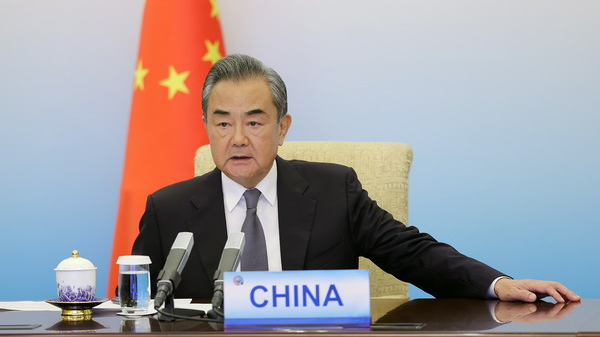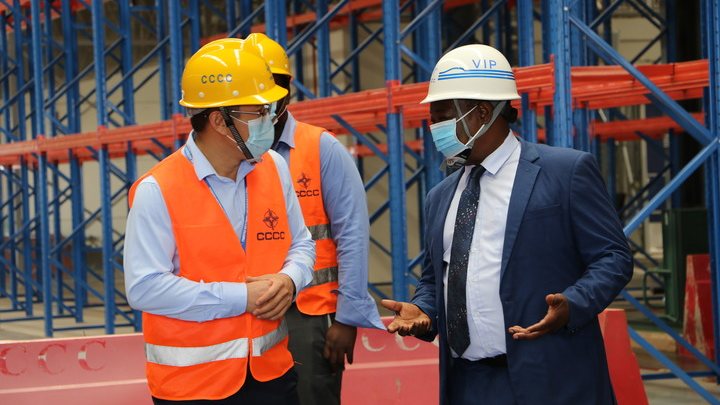
Chinese State Councilor and Foreign Minister Wang Yi hosts the Coordinators' Meeting on the Implementation of the Follow-up Actions of the Eighth Ministerial Conference of the FOCAC via video link, August 18, 2022. /Chinese Foreign Ministry
Chinese State Councilor and Foreign Minister Wang Yi hosts the Coordinators' Meeting on the Implementation of the Follow-up Actions of the Eighth Ministerial Conference of the FOCAC via video link, August 18, 2022. /Chinese Foreign Ministry
Editor's note: Xin Ge is an associate professor at the School of Public Economics and Administration, Shanghai University of Finance and Economics. The article reflects the author's opinions and not necessarily the views of CGTN.
The Coordinators' Meeting on the Implementation of the Follow-up Actions of the Eighth Ministerial Conference of the Forum on China-Africa Cooperation (FOCAC) was held via video link on August 18. Chinese State Councilor and Foreign Minister Wang Yi attended the meeting and made a proposal on building a China-Africa community with a shared future in the new era.
The Eighth FOCAC Ministerial Conference was held in Senegalese capital of Dakar from November 29 to 30, 2021, which culminated with the Dakar Declaration, the Dakar Action Plan (2022-2024), the China-Africa Cooperation Vision 2035 and the Declaration on China-Africa Cooperation on Combating Climate Change.
The FOCAC, the 22-year old operation mechanism between China and Africa was founded at the turn of the century and has become a model of international cooperation. The forum comprises of China, 53 African countries and the African Union (AU) Commission and meets every three years. It represents one of the earliest regional forum mechanisms of China's multilateralism in the developing world.
This year marks the 66th anniversary of the establishment of diplomatic relations between China and Africa. Over the past decades, China and Africa have stood shoulder to shoulder in the struggle for national independence and liberation and in the nation-building process. The 66 years of friendship has forged a brotherhood of sharing blood and sweat, blazing a distinctive trail of win-win cooperation.
Established in 2000, the FOCAC is the first institutionalized dialogue platform set up by China and developing countries to further enhance cooperation, witnessing the exponential development of the Sino-Africa relations.
According to the General Administration of Customs of China, the China-Africa trade rose by 35.3 percent year on year to $254.3 billion in 2021, while Africa exported goods worth of $105.9 billion to China, up 43.7 percent. Africa's infrastructure profile and industrialization pace has also advanced dramatically. Since 2000, Chinese companies have built or upgraded more than 10,000 km of railways, nearly 100,000 km of highways across the African continent, and created over 4.5 million jobs.

Li Qinpu (L), project manager of the China Communications Construction Company, and Ayub Sooma (R), director of airports and aviation security at the Uganda Civil Aviation Authority, talk at the newly constructed cargo center of Entebbe International Airport in Entebbe, Uganda, October 6, 2021. /Xinhua
Li Qinpu (L), project manager of the China Communications Construction Company, and Ayub Sooma (R), director of airports and aviation security at the Uganda Civil Aviation Authority, talk at the newly constructed cargo center of Entebbe International Airport in Entebbe, Uganda, October 6, 2021. /Xinhua
The meeting on August 18 is important because it is meant to implement the actions proposed in the previous forum or summit. After the triennial forum was held, an action plan covering various arenas for the next three years would be issued and put into practice. The follow-up actions might be regarded as the most distinctive feature of the FOCAC mechanism, whose key aim is to deliver tangible and practical results on the outcomes of heads of states' summits or ministerial conferences.
Under the China-Africa Cooperation Vision 2035 announced at the Eighth FOCAC Ministerial Meeting, China is expected to work with Africa in nine aspects, varying from health, poverty alleviation to security, which clearly not merely align with the major requirements of Africa to accelerate growth, but also broaden cooperation between the two.
The broadening cooperation can be remarkably reflected on several aspects. First, China has planned not only to provide one billion doses of vaccines to Africa, but also help the continent to boost its capacity for localized vaccine production. Up to now, Africa has the lowest vaccination rate for anti-COVID-19 across the globe due to the low productivity and high cost of vaccines. It is noteworthy that of the one billion doses, 600 million are in the form of donations. This is a powerful message of China and African working together to close the "immunization gap."
Moreover, China has upgraded China-Africa business cooperation by boosting the Belt and Road Initiative (BRI). Fifty-two African countries and the AU Commission have signed BRI cooperation agreements with China, providing new drivers for China-Africa cooperation.
Furthermore, China has promised to step up peace and security cooperation with Africa. China vows to bolster African countries' efforts to independently maintain regional security and fight against terrorism, and delivery military assistance to the AU.
At the opening ceremony of the Eighth FOCAC Ministerial Conference, Chinese President Xi Jinping summarized the spirit of China-Africa relations as "sincere friendship and equality, win-win for mutual benefit and common development, fairness and justice, and progress with the times and openness and inclusiveness." With this spirit, it stands to reason that the FOCAC has become so resilient, robust and visible among partnerships across the world, and we are assured that China-Africa cooperation will continue to broaden and deepen.
(If you want to contribute and have specific expertise, please contact us at opinions@cgtn.com. Follow @thouse_opinions on Twitter to discover the latest commentaries in the CGTN Opinion Section.)

